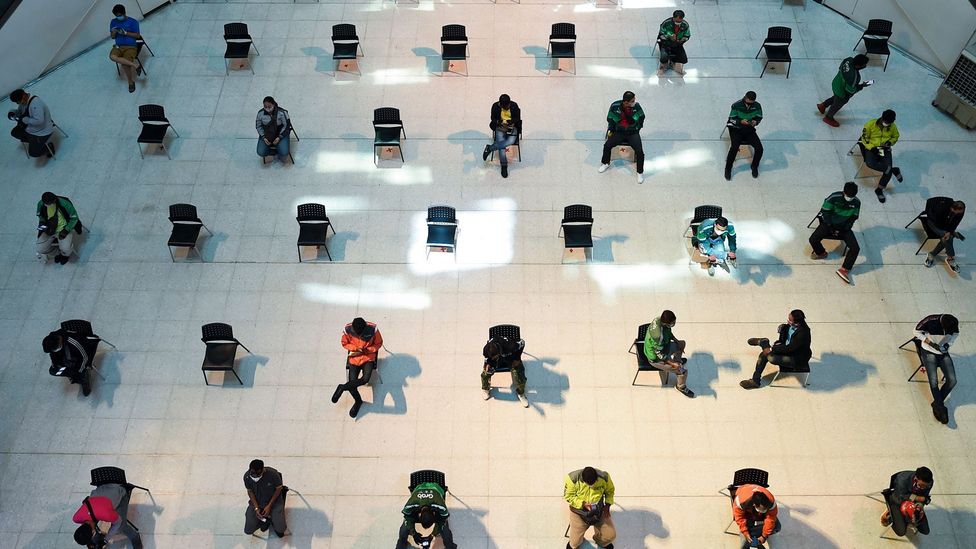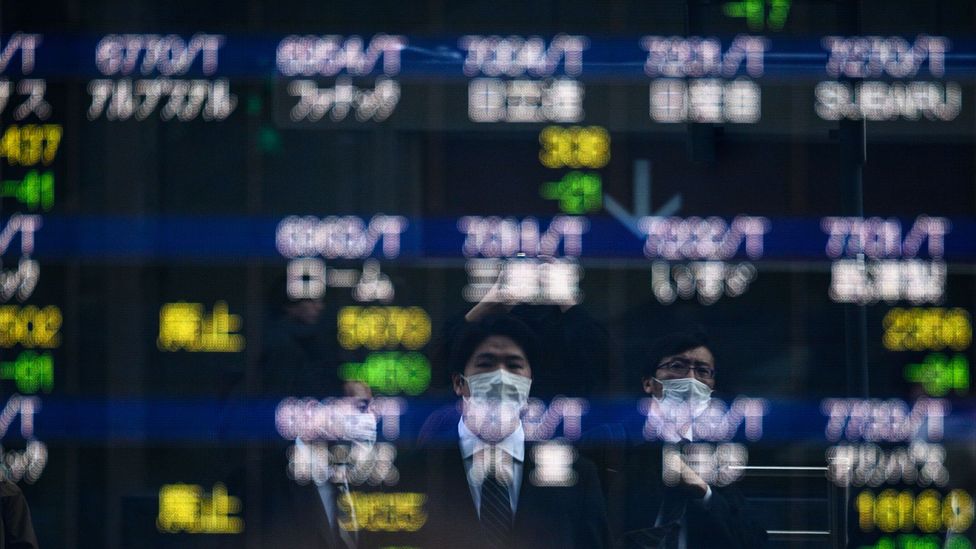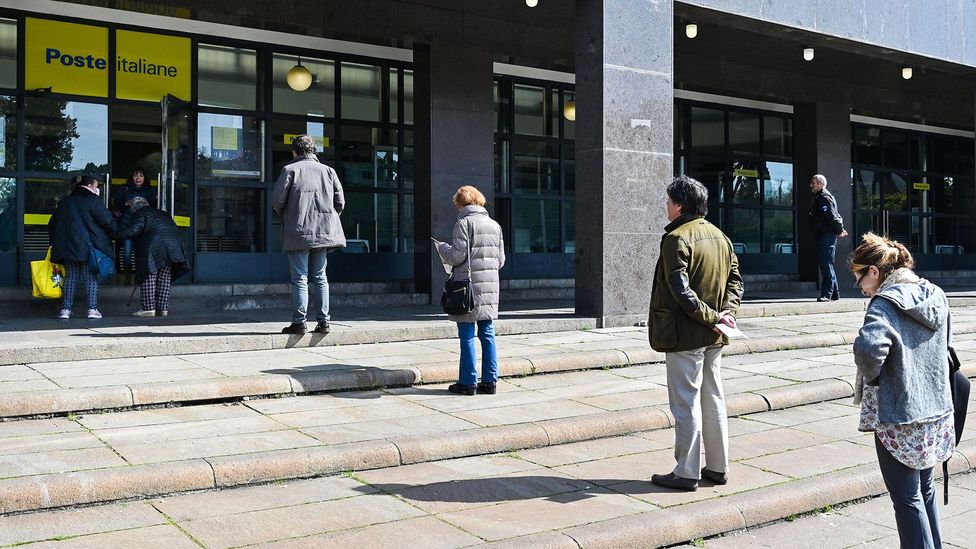Again Im on the Slow Decent Down Again I Will Slowly Loose Friends
How will coronavirus alter the globe?
(Image credit:
Getty Images
)

Could the huge shifts in our way of life being introduced as part of the fight against Covid-nineteen pave the way for a more humane economy?
W
Where will we be in half-dozen months, a year, 10 years from at present? I prevarication awake at night wondering what the future holds for my loved ones. My vulnerable friends and relatives. I wonder what will happen to my chore, even though I'm one of the lucky ones: I get good sick pay and tin work remotely. I am writing this from the UK, where I withal have self-employed friends who are staring down the butt of months without pay, friends who have already lost jobs. The contract that pays eighty% of my salary runs out in December. Coronavirus is striking the economy bad. Will anyone be hiring when I need work?
There are a number of possible futures, all dependent on how governments and club respond to coronavirus and its economic aftermath. Hopefully nosotros will use this crisis to rebuild, produce something better and more humane. But we may slide into something worse.
I think we can empathise our situation – and what might lie in our future – past looking at other crises. My research focuses on the fundamentals of the modern economy: global supply chains, wages, and productivity. I look at the style that economical dynamics contribute to challenges similar climatic change and low levels of mental and physical wellness among workers. I accept argued that we need a very unlike kind of economics if we are to build socially just and ecologically sound futures. In the confront of Covid-19, this has never been more than obvious.
You might also like:
• Will Covid-19 take a lasting bear on on the environment?
• Covid-19: the history of pandemics
• Why social distancing might last for some time
The responses to the Covid-nineteen pandemic are only the amplification of the dynamic that drives other social and ecological crises: the prioritisation of one type of value over others. This dynamic has played a large role in driving global responses to Covid-19. So as responses to the virus evolve, how might our economic futures develop?

The way nosotros exercise business concern and interact could exist fundamentally inverse by Covid-19 (Credit: Getty Images)
From an economical perspective, in that location are four possible futures: a descent into barbarism, a robust state capitalism, a radical state socialism, and a transformation into a big order built on common assistance. Versions of all of these futures are perfectly possible, if not as desirable.
Small changes don't cut it
Coronavirus, like climate alter, is partly a trouble of our economical construction. Although both appear to exist "ecology" or "natural" problems, they are socially driven.
Yes, climate change is caused past certain gases absorbing rut. But that'due south a very shallow explanation. To really understand climate modify, we need to understand the social reasons that keep us emitting greenhouse gases.
Likewise with Covid-xix. Yep, the direct cause is the virus. But managing its furnishings requires the states to understand human behaviour and its wider economic context.
Tackling both Covid-xix and climatic change is much easier if yous reduce non-essential economic action. For climate alter this is because if you lot produce less stuff, y'all use less energy, and emit fewer greenhouse gases. The epidemiology of Covid-19 is rapidly evolving. Merely the core logic is similarly simple. People mix together and spread infections. This happens in households, and in workplaces, and on the journeys people make. Reducing this mixing is likely to reduce person-to-person transmission and pb to fewer cases overall.
Reducing contact between people probably also helps with other control strategies. One common control strategy for infectious illness outbreaks is contact tracing and isolation, where an infected person's contacts are identified, and so isolated to prevent further disease spread. This is nearly effective when you trace a high per centum of contacts. The fewer contacts a person has, the fewer you lot have to trace to go to that higher pct.
We can see from Wuhan that social distancing and lockdown measures like this are effective. Political economic system is useful in helping us empathise why they weren't introduced earlier in European countries (most notably the United kingdom and the United states).
A delicate economy
Lockdown is placing force per unit area on the global economic system. We confront a serious recession. This pressure has led some globe leaders to call for an easing of lockdown measures.
The economics of collapse are adequately directly forrad. Businesses exist to brand a profit. If they can't produce, they tin can't sell things. This means they won't make profits, which means they are less able to employ yous. Businesses can and practice (over short time periods) concur on to workers that they don't need immediately: they want to be able to run into demand when the economy picks back upwardly again. But, if things start to expect actually bad, and then they won't. So, more people lose their jobs or fear losing their jobs. Then they buy less. And the whole wheel starts again, and we spiral into an economical low.
In a normal crunch the prescription for solving this is elementary – the government spends, and it spends until people offset consuming and working again.
But normal interventions won't work here because we don't want the economy to recover (at to the lowest degree, not immediately). The whole point of the lockdown is to stop people going to work, where they spread the disease. One contempo study suggested that lifting lockdown measures in Wuhan (including workplace closures) too soon could run across China experience a 2nd peak of cases later in 2020.
Equally the economist James Meadway wrote, the correct Covid-19 response isn't a wartime economy – with massive upscaling of production. Rather, we need an "anti-wartime" economy and a massive scaling back of product. And if we want to exist more resilient to pandemics in the hereafter (and to avoid the worst of climate change) we need a system capable of scaling back production in a way that doesn't mean loss of livelihood.

Many of the best paid jobs serve no wider purpose than simply to make money (Credit: Getty Images)
So what nosotros need is a different economic mindset. We tend to retrieve of the economy as the way we buy and sell things, mainly consumer goods. Merely this is not what an economy is or needs to be. At its cadre, the economy is the way we take our resources and plough them into the things we need to alive. Looked at this way, nosotros can beginning to see more opportunities for living differently that permit us to produce less stuff without increasing misery.
I and other ecological economists have long been concerned with the question of how you produce less in a socially just fashion, because the challenge of producing less is also cardinal to tackling climatic change. All else equal, the more nosotros produce, the more than greenhouse gases we emit. So how exercise y'all reduce the corporeality of stuff you lot make while keeping people in work?
Proposals include reducing the length of the working week, or, as some of my recent work has examined, you could permit people to piece of work more slowly and with less pressure. Neither of these is directly applicable to Covid-19, where the aim is reducing contact rather than output, only the core of the proposals is the same. You have to reduce people'south dependence on a wage to be able to live.
What is the economy for?
The key to agreement responses to Covid-19 is the question of what the economy is for. Currently, the primary aim of the global economy is to facilitate exchanges of money. This is what economists call "exchange value".
The dominant idea of the current organisation we live in is that "exchange value" is the aforementioned affair every bit "utilize value". Basically, people volition spend coin on the things that they want or need, and this deed of spending money tells us something nearly how much they value its "apply". This is why markets are seen every bit the best mode to run lodge. They permit you lot to adapt, and are flexible plenty to match up productivity capacity with employ value.
What Covid-nineteen is throwing into sharp relief is just how simulated our beliefs about markets are. Around the world, governments fear that critical systems volition be disrupted or overloaded: supply chains, social care, but principally healthcare. There are lots of contributing factors to this. Just permit'south take two.
First, it is quite hard to make money from many of the most essential societal services. This is in office because a major commuter of profits is labour productivity growth: doing more than with fewer people. People are a big cost cistron in many businesses, especially those that rely on personal interactions, like healthcare. Consequently, productivity growth in the healthcare sector tends to be lower than the residual of the economy, so its costs go up faster than boilerplate.
2nd, jobs in many critical services aren't those that tend to exist highest valued in society. Many of the all-time paid jobs only exist to facilitate exchanges: to brand coin. They serve no wider purpose to society.
Yet because they make lots of money we have lots of consultants, a huge advertising industry and a massive financial sector.
Meanwhile, we have a crisis in health and social care, where people are often forced out of useful jobs they bask because these jobs don't pay them plenty to live.
Pointless jobs
The fact that and so many people piece of work pointless jobs is partly why we are so ill prepared to reply to Covid-19. The pandemic is highlighting that many jobs are not essential, nevertheless we lack sufficient cardinal workers to respond when things go bad.
People are compelled to work pointless jobs because in a guild where commutation value is the guiding principle of the economic system, the basic goods of life are mainly available through markets. This ways you accept to buy them, and to purchase them you need an income, which comes from a job.

Even the bright lights of Las Vegas take dimmed as casinos take closed their doors due to Covid-xix (Credit: Getty Images)
The other side of this coin is that the most radical (and constructive) responses that we are seeing to the Covid-19 outbreak challenge the dominance of markets and commutation value. Effectually the earth governments are taking actions that three months ago looked incommunicable. In Spain, individual hospitals have been nationalised. In the Britain, the prospect of nationalising diverse modes of transport has become very existent. And French republic has stated its readiness to nationalise large businesses.
Likewise, we are seeing the breakdown of labour markets. Countries like Kingdom of denmark and the United kingdom are providing people with an income in lodge to finish them from going to piece of work. This is an essential part of a successful lockdown. These measures are far from perfect. Withal, it is a shift from the principle that people have to work in lodge to earn their income, and a movement towards the idea that people deserve to exist able to live even if they cannot piece of work.
This reverses the dominant trends of the concluding 40 years. Over this time, markets and substitution values have been seen as the best mode of running an economy. Consequently, public systems have come up under increasing pressure to marketise, to be run as though they were businesses who had to make money. Likewise, workers have become more than and more exposed to the market – zero-hours contracts and the gig economy have removed the layer of protection from market fluctuations that long term, stable, employment used to offer.
Covid-nineteen appears to be reversing this tendency, taking healthcare and labour goods out of the market and putting it into the hands of the state. States produce for many reasons. Some good and some bad. But unlike markets, they practice not have to produce for substitution value lonely.
These changes requite me hope. They give us the chance to relieve many lives. They even hint at the possibility of longer term change that makes us happier and helps us tackle climatic change. But why did information technology take us so long to get here? Why were many countries so ill-prepared to irksome downwardly production? The answer lies in a recent Globe Health Organisation (WHO) report: they did non have the right "mindset".
Our economic imaginations
There has been a broad economic consensus for 40 years. This has express the power of politicians and their advisers to see cracks in the system, or imagine alternatives. This mindset is driven past two linked behavior:
- The market is what delivers a good quality of life, so it must exist protected
- The market will e'er return to normal after short periods of crisis
These views are common to many Western countries. Simply they are strongest in the Uk and the US, both of which have appeared to be badly prepared to respond to Covid-19.
In the UK, attendees at a private engagement reportedly summarised the Prime Minister'due south almost senior aide's approach to Covid-nineteen every bit "herd immunity, protect the economy, and if that ways some pensioners die, too bad". The authorities has denied this, simply if existent, it's not surprising. At a government event early in the pandemic, a senior ceremonious retainer said to me: "Is it worth the economic disruption? If you wait at the treasury valuation of a life, probably non."
This kind of view is endemic in a item elite grade. Information technology is well represented by a Texas official who argued that many elderly people would gladly die rather than run across the United states of america sink into economical depression. This view endangers many vulnerable people (and not all vulnerable people are elderly), and, equally I have tried to lay out here, information technology is a false selection.

It is hoped that life volition render to normal when the restrictions to irksome the spread of coronavirus are lifted, but information technology might not (Credit: Getty Images)
One of the things the Covid-xix crisis could be doing, is expanding that economic imagination. As governments and citizens take steps that three months ago seemed impossible, our ideas near how the world works could change rapidly. Let us look at where this re-imagining could have us.
4 futures
To help u.s.a. visit the future, I'm going to use an old technique from the field of futures studies. Y'all take two factors you think will be of import in driving the future, and you imagine what will happen under different combinations of those factors.
The factors I want to take are value and centralisation. Value refers to whatever is the guiding principle of our economy. Do we use our resource to maximise exchanges and coin, or do we use them to maximise life? Centralisation refers to the ways that things are organised, either by of lots of small units or by one big commanding force. We can organise these factors into a grid, which tin can then be populated with scenarios. And so we tin think well-nigh what might happen if we endeavor to respond to the coronavirus with the following four extreme combinations:
- State commercialism: centralised response, prioritising commutation value
- Barbarism: decentralised response, prioritising exchange value
- State socialism: centralised response, prioritising the protection of life
- Mutual assist: decentralised response, prioritising the protection of life.
Land commercialism
State capitalism is the dominant response we are seeing across the world right now. Typical examples are the United kingdom, Espana and Denmark.
The country capitalist gild continues to pursue exchange value as the guiding light of the economic system. But information technology recognises that markets in crunch require support from the state. Given that many workers cannot work because they are ill, and fear for their lives, the land steps in with extended welfare. It also enacts massive Keynesian stimulus by extending credit and making direct payments to businesses.
The expectation here is that this is volition be for a short period. The principal function of the steps being taken is to let as many businesses equally possible to keep on trading. In the U.k., for example, food is still distributed past markets (though the government has relaxed competition laws). Where workers are supported direct, this is washed in means that seek to minimise disruption to normal labour market place functioning. And so, for example, every bit in the UK, payments to workers have to be applied for and distributed by employers. And the size of payments is made on the basis of the exchange value a worker usually creates in the market, rather than the usefulness of their piece of work.
Could this be a successful scenario? Possibly, but only if Covid-19 proves controllable over a brusque menstruation. As full lockdown is avoided to maintain market place performance, manual of infection is still likely to go along. In the Great britain, for case, non-essential construction is still standing, leaving workers mixing on building sites. Only limited state intervention will become increasingly hard to maintain if death tolls ascension. Increased affliction and death volition provoke unrest and deepen economic impacts, forcing the state to take more and more than radical deportment to try to maintain marketplace functioning.
Barbarism
This is the bleakest scenario. Barbarism is the time to come if we continue to rely on exchange value equally our guiding principle and yet decline to extend support to those who become locked out of markets past illness or unemployment. It describes a situation that we accept not notwithstanding seen.
Businesses fail and workers starve because there are no mechanisms in place to protect them from the harsh realities of the market. Hospitals are not supported past extraordinary measures, and so go overwhelmed. People die. Atrocity is ultimately an unstable land that ends in ruin or a transition to one of the other filigree sections subsequently a period of political and social devastation.
Could this happen? The concern is that either information technology could happen past mistake during the pandemic, or by intention subsequently the pandemic peaks. The error is if a government fails to step in in a big plenty mode during the worst of the pandemic. Support might exist offered to businesses and households, only if this isn't enough to preclude marketplace collapse in the face up of widespread affliction, chaos would ensue. Hospitals might be sent extra funds and people, simply if information technology's not plenty, those who need treatment will be turned away in large numbers.

With millions of people now working from dwelling, returning to function life equally usual may be difficult (Credit: Getty Images)
Potentially only as consequential is the possibility of massive austerity after the pandemic has peaked and governments seek to return to "normal". This has been threatened in Deutschland. This would exist disastrous. Non least because the defunding of disquisitional services during thrift has impacted the ability of countries to answer to this pandemic.
The subsequent failure of the economy and social club would trigger political and stable unrest, leading to a failed state and the collapse of both country and community welfare systems.
State socialism
Land socialism describes the first of the futures we could see with a cultural shift that places a dissimilar kind of value at the heart of the economy. This is the future we get in at with an extension of the measures we are currently seeing in the UK, Spain and Denmark.
The cardinal here is that measures similar the nationalisation of hospitals and payments to workers are seen not as tools to protect markets, but a way to protect life itself. In such a scenario, the country steps in to protect the parts of the economy that are essential to life: the product of food, energy and shelter for instance, so that the basic provisions of life are no longer discipline to the whims of the market. The state nationalises hospitals, and makes housing freely available. Finally, information technology provides all citizens with a means of accessing various goods – both basics and whatever consumer goods that we are able to produce with a reduced workforce.
Citizens no longer rely on employers as intermediaries between them and the bones materials of life. Payments are fabricated to everyone directly and are not related to the exchange value they create. Instead, payments are the aforementioned to all (on the basis that nosotros deserve to exist able to live, merely because we are live), or they are based on the usefulness of the work. Supermarket workers, delivery drivers, warehouse stackers, nurses, teachers, and doctors are the new CEOs.
Information technology's possible that land socialism emerges as a consequence of attempts at state capitalism and the effects of a prolonged pandemic. If deep recessions happen and there is disruption in supply bondage such that demand cannot exist rescued by the kind of standard Keynesian policies nosotros are seeing at present (printing coin, making loans easier to get and then on), the state may have over production.
At that place are risks to this approach – we must exist careful to avoid absolutism. But done well, this may be our best hope against an farthermost Covid-19 outbreak. A strong state able to marshal the resources to protect the core functions of economy and guild.
Mutual assist
Mutual assistance is the second time to come in which we adopt the protection of life equally the guiding principle of our economy. Nevertheless, in this scenario, the state does not accept a defining role. Rather, individuals and modest groups begin to organise support and care within their communities.
The gamble with this future is that minor groups are unable to rapidly mobilise the kind of resources needed to effectively increase healthcare chapters, for instance. Simply mutual aid could enable more effective transmission prevention, by building community support networks that protect the vulnerable and police force isolation rules. The most ambitious class of this futurity sees new democratic structures arise. Groupings of communities that are able to mobilise substantial resources with relative speed. People coming together to program regional responses to stop the spread of the illness and (if they have the skills) to treat patients.
This kind of scenario could emerge from whatsoever of the others. It is a possible fashion out of barbarism, or state commercialism, and could support state socialism. We know that community responses were primal to tackling the West African Ebloa outbreak. And we already encounter the roots of this time to come today in the groups organising care packages and community support. Nosotros tin can see this as a failure of state responses. Or nosotros can see it every bit a pragmatic, compassionate societal response to an unfolding crisis.
Promise and fear
These visions are extreme scenarios, caricatures, and likely to bleed into one another. My fear is the descent from state capitalism into atrocity. My promise is a blend of state socialism and mutual aid: a strong, democratic state that mobilises resources to build a stronger health system, prioritises protecting the vulnerable from the whims of the market and responds to and enables citizens to form common aid groups rather than working meaningless jobs.
What is hopefully articulate is that all these scenarios leave some grounds for fearfulness, but too some for hope. Covid-xix is highlighting serious deficiencies in our existing system. An effective response to this is likely to require radical social alter. I take argued that information technology requires a drastic move away from markets and the utilize of profits as the primary way of organising an economy. The upside of this is the possibility that we build a more than humane organisation that leaves us more resilient in the face of future pandemics and other impending crises like climatic change.
Social change tin can come from many places and with many influences. A cardinal task for us all is demanding that emerging social forms come from an ethic that values intendance, life, and democracy. The key political job in this time of crunch is living and (almost) organising around those values.
* Simon Mair is a Research Young man in Ecological Economics at the Academy of Surrey
This article is adjusted from a piece that originally appeared on The Conversation, and is republished under a Artistic Eatables licence.
--
As an award-winning scientific discipline site, BBC Future is committed to bringing you evidence-based assay and myth-busting stories around the new coronavirus. You tin can read more than of our Covid-19 coverage hither .
--
Bring together one million Future fans by liking us on Facebook , or follow us on Twitter or Instagram .
If you liked this story, sign upwardly for the weekly bbc.com features newsletter , chosen "The Essential List". A handpicked option of stories from BBC Future, Civilisation, Worklife, and Travel, delivered to your inbox every Friday.
mockridgeinateptind.blogspot.com
Source: https://www.bbc.com/future/article/20200331-covid-19-how-will-the-coronavirus-change-the-world